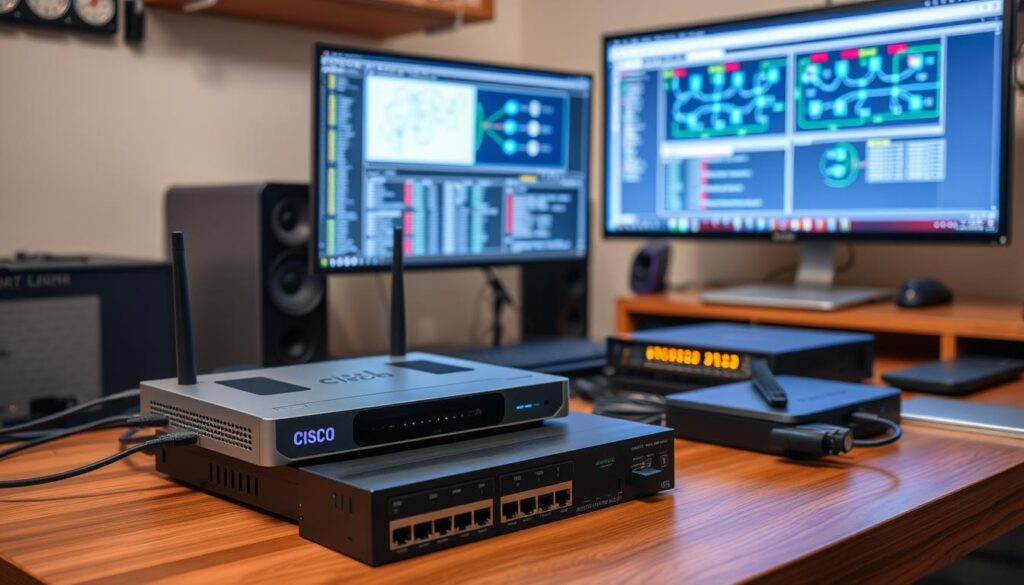You’ve probably wondered how to stand out in the competitive world of IT networking. With rapid industry changes and evolving skill demands, it’s easy to feel stuck. Here’s the good news: the updated 2023 exam structure reflects real-world networking needs, making this credential more relevant than ever.
Professionals with this certification often see starting salaries between $58,000 and $85,000 annually. The U.S. Bureau of Labor Statistics predicts steady growth for network-related roles, with over 240,000 job openings each year through 2032. Whether you’re aiming for roles like network engineer or security specialist, this certification validates your skills and adaptability.
Beyond immediate job prospects, it’s a gateway to advanced specializations and leadership positions. The credential remains valid for three years, encouraging continuous learning—a must in fast-paced tech environments. Let’s explore how this certification can shape your professional journey.
Key Takeaways
- The 2023 exam update aligns with current industry demands, ensuring practical relevance.
- Average salaries for certified professionals range from $60,000 to $150,000+ depending on role and location.
- Over 240,000 annual job openings in network-related fields highlight strong demand.
- Roles like network administrator, security specialist, and systems engineer commonly require this certification.
- Certification renewal every three years fosters ongoing skill development.
Understanding the Modern CCNA Certification Landscape
Networking roles are evolving faster than ever, and staying updated matters. The latest exam structure simplifies learning by focusing on real-world applications. You’ll tackle six core areas designed to build practical expertise—no more guessing which skills matter most.
What the Updated Exam Covers
Imagine configuring a secure network while troubleshooting automation scripts—all in one test. The 2023 version blends network fundamentals with modern demands like cloud integration and IoT security. Key areas include:
- IP connectivity (IPv4/IPv6 routing)
- Automation tools like Python and APIs
- Security protocols for threat prevention
You’ll face simulations mirroring workplace scenarios, such as deploying VLANs or diagnosing connectivity issues. This hands-on approach ensures you’re job-ready, not just theory-smart.
Why the New Format Benefits You
Gone are the days of memorizing outdated concepts. The streamlined exam ($300 fee) now prioritizes skills employers want. For example, 73% of hiring managers value automation proficiency—a key focus area. Plus, recertification through Continuing Education credits keeps your knowledge fresh without retesting.
Think of it as a toolkit: you gain cloud management abilities and problem-solving techniques that apply across industries. This flexibility makes transitioning between roles—like network engineer or systems analyst—smoother than ever.
The Transformation of Cisco Certifications in 2024
Change can feel daunting, especially when certification paths shift under your feet. Cisco’s recent overhaul simplifies what once felt like a maze of options. In 2023, they merged nine specialized tracks into one unified Associate-level credential, cutting through the clutter for newcomers.
Navigating the Shift in Exam Structures and Tiers
Remember when you had to choose between security, wireless, or cloud specializations? The new system replaces those silos with a single foundation. Now, every aspiring professional starts with core networking skills before branching into advanced roles. Think of it as building a house—you lay the groundwork first.
The updated Cisco Certified Network Associate program now includes automation and cybersecurity basics. This mirrors what modern networks demand. For example, 62% of network administrators report managing hybrid cloud setups daily—skills the new curriculum addresses head-on.
Here’s why this matters for you:
- No more guessing which specialization fits your goals early on
- Clear progression from Associate to Expert levels with fewer roadblocks
- Recognition for incremental achievements through Specialist certifications
These changes act like a GPS for your career path. Instead of navigating outdated maps, you follow a streamlined highway to roles like systems engineer or security analyst. The hands-on lab exams ensure you’re tested on real scenarios, not just textbook theories.
This clarity helps you focus on building skills that matter most for roles like network administrators or engineers. Next, let’s explore how these updates translate into tangible professional growth.
CCNA Career Opportunities
Imagine stepping into a role where your skills shape how businesses communicate and secure their data. Over 1 million professionals have used this credential to unlock doors in IT since 1998. Let’s explore where your expertise could take you.

Job Roles: From Network Administrator to Engineer
As a network administrator, you’ll troubleshoot connectivity issues and manage daily operations. The average salary ranges from $60,000 to $90,000, with top earners in tech hubs like Silicon Valley. Many Fortune 500 companies seek these skills to maintain their digital backbone.
Network engineers take it further by designing entire systems. They earn $100,000-$150,000 annually, especially when handling cloud integrations or hybrid setups. One systems administrator shared how their certification helped them transition to managing enterprise-level networks for a healthcare organization.
Salary Trends and Long-Term Growth Prospects
Location matters. Professionals in Washington D.C. average $84,030 yearly, while those in Texas see $78,900. Cybersecurity roles blend networking and security expertise, offering median salaries near $134,800. Demand for these hybrid skills grew 43% last year alone.
Your experience level also impacts earnings. Entry-level network specialists start around $58,000, but senior engineers with automation skills often surpass $140,000. Companies value certifications that prove you can adapt to evolving technologies like IoT and software-defined networks.
Ready to develop the hands-on expertise employers want? Let’s explore practical ways to build your skills next.
Building Your Networking Skills and Hands-On Experience
Ever feel like textbook knowledge isn’t enough to tackle real-world network challenges? You’re not alone. Practical expertise separates confident professionals from those stuck in theory. Here’s how to bridge that gap effectively.

Leveraging Home Labs and Online Training
Start with a budget-friendly home lab. Used Cisco switches or virtual tools like Packet Tracer let you experiment with routing protocols and VLAN configurations. One user reported fixing a corporate access issue by recreating it first on their kitchen-table lab.
Pair physical practice with structured learning. Platforms like CBT Nuggets offer video courses that mirror actual exam scenarios. Their Cisco CCNA program includes labs where you’ll:
- Configure OSPF for efficient data flow
- Troubleshoot DHCP server errors
- Secure network devices against unauthorized access
Stuck? Join forums like Reddit’s r/ccna. Members often share scripts for automating repetitive tasks—skills the 2023 exam now tests. Infosec’s training modules even let you practice cloud integrations, a must for modern networks.
These steps do more than prep you for tests. They build muscle memory for handling live data migrations or outage crises. One graduate landed a systems engineer role after showcasing their home lab projects during interviews.
Ready to turn knowledge into action? Your next breakthrough starts with a router and determination.
Future Trends Shaping Your CCNA Journey
What if your expertise could adapt as fast as technology evolves? The IT landscape now demands professionals who blend networking know-how with emerging tech fluency. Let’s explore how shifts like remote infrastructure and AI-driven security are redefining success.
Remote Work’s Lasting Impact
Hybrid work models aren’t going away—they’re creating new challenges. Over 68% of companies now manage cloud-based networks supporting remote teams. This means you’ll troubleshoot VPN issues more often while optimizing bandwidth for video conferencing tools.
Consider this: network administrators who master multi-cloud setups saw a 22% salary bump last year. Roles like cloud infrastructure architect are growing twice as fast as traditional positions.
Cybersecurity Becomes Non-Negotiable
Every connected device is a potential entry point for threats. With 3.5 million cybersecurity jobs unfilled globally, professionals who understand both firewalls and network design stand out. For example, security engineers now earn $134,800 on average—43% more than five years ago.
| Role | Key Skill | Avg Salary | Growth (2024-2028) |
|---|---|---|---|
| Network Architect | SD-WAN Design | $121,000 | 12% |
| Cybersecurity Analyst | Threat Detection | $93,888 | 31% |
| Automation Engineer | Python Scripting | $109,500 | 19% |
Lifelong Learning as Career Fuel
New tools emerge faster than certifications update. That’s why engineers responsible for designing resilient systems prioritize microlearning. One pro shared how weekly lab sessions helped them deploy IoT security protocols six months before their peers.
Stay ahead by mastering automation platforms and zero-trust architectures. Remember—your ability to learn determines how far you’ll go in roles like network architect or security operations lead.
Conclusion
In a field where technology never stops evolving, your ability to adapt defines success. The credential we’ve explored opens doors to roles shaping how businesses connect and protect data—from configuring cloud networks to blocking cyber threats. With average salaries exceeding $85,000 and over 240,000 annual job openings, the path ahead is clear.
Modern exam updates ensure you learn skills employers actually need. Hands-on practice with automation tools and security protocols prepares you for real workplace challenges. These aren’t just checkboxes—they’re tools to design resilient systems in our hybrid-work world.
Keep growing. Explore training labs, join tech communities, and tackle new certifications as trends shift. Every script you write or network you secure strengthens your value in this computer-driven landscape.
Your next move? Start small. Set up a home lab, master one new skill this month, and watch how doors open. The digital world needs problem-solvers—why not make your mark?
FAQ
Is the Cisco Certified Network Associate certification worth pursuing in 2024?
What job roles can you explore after earning this credential?
How has the exam structure changed recently?
What salary can you expect with this certification?
How does remote work affect demand for these skills?
Why is cybersecurity knowledge emphasized in the updated curriculum?
Can you practice skills without corporate equipment?
Source Links
- How Does Cisco CCNA Certification Boost Your IT Career?
- What Types of Jobs Can You Get with a CCNA?
- CCNA Career Opportunities | Job Scope | Certification Demand
- The Definitive Guide To The CCNA Certification – MyComputerCareer
- Understanding CCNA v1.1 Certification
- New Changes to the Cisco Certification and Training Program | Our Blogs
- CCNA: The foundation that built my IT career (can be yours, too)
- What Can I Do With A Cisco CCNA Certification? – MyComputerCareer
- Steer Your Career: CCNA & Cybersecurity Jobs Outlook
- CCNA certification boosts networking skills & career growth
- Is CCNA Worth It in 2025? Everything You Must Know
- CCNA Job Scope: Career Opportunities and Certification Demand
- Reasons to Build a Career With CCNA Certification – GITServices





